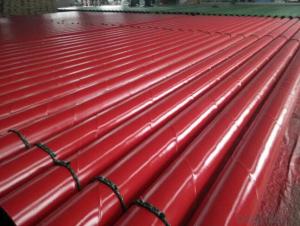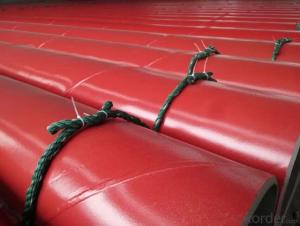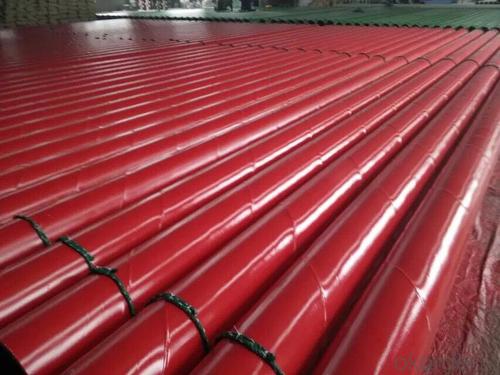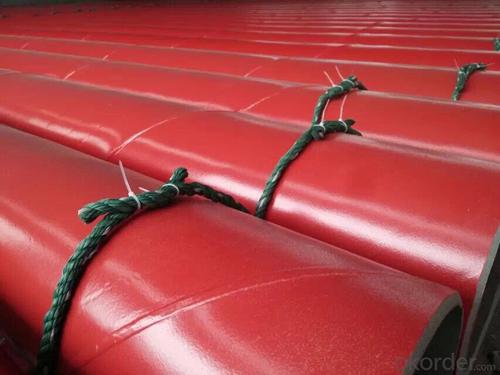LSAW 3PE steel pipe external coating
- Loading Port:
- China Main Port
- Payment Terms:
- TT OR LC
- Min Order Qty:
- -
- Supply Capability:
- -
OKorder Service Pledge
OKorder Financial Service
You Might Also Like
Specifications
water pipeline inner-layer tape
1 Butyl rubber as adhesive
2. SGS test report and DVGW certificate
3. corrosion protection
water pipeline inner-layer tape
State-of-the-Art Pipeline Protection for All Climates & Environments
System description:
WATER PIPELINE Inner -layer tape also be called pipe wrap anti-corrosion tape, polyethylene wrap tape.
water pipeline Inner-layer tapeT100 is engineered to assure a high bond to the primed pipe surface with excellent conformability characteristics, aggressive adhesive for corrosion protection and repair of main line coatings.
Inner-layer tapeT100 series is cold applied tape coating system for corrosion protection of Oil, Gas, Petrochemical, and Waste Waterburied pipeline, pipe can be buried, also can be underground ,overhead ,onshore and offshore .
Structure of water pipeline inner wrap tape
The specification of the tape consists of two layers, adhesive layer and film backing
Adhesive: butyl rubber
Film backing: Special blend of stabilized polyethylene
Features & Benefits
Provides a permanent bond to the primed steel pipes surface and provides protection against chemical electrolytic corrosion for underground pipelines.
long term corrosion protection
Worldwide reference lists. Established in-ground history
High chemical resistance under service temperature.
Outstanding electric property and permanent adhesion.
Cold applied, No release liner. Makes installation fast and easy.
Complies with EN-DIN 30672 and AWWAC-214 international standards and also ASTM standards.
Be used for water pipeline corrosion protection
System Properties
Type | T138 | T 150 | T165 | T180 | T 250 | T265 | T280 | |
Thickness | 15mil 0.38mm | 20mil 0.508mm | 25mil 0.635mm | 30mil 0.762mm | 20mil 0.508mm | 25mil 0.635mm | 30mil 0.762mm | |
Backing | 9mil 0.229mm | 9mil 0.241mm | 10mil 0.25mm | 10mil 0.25mm | 15mil 0.38mm | 20mil 0.508mm | 25mil 0635mm | |
Adhesive | 6mil 0.152mm | 11mil 0.279mm | 15mil 0.381mm | 20mil 0.508mm | 5mil 0.127mm | 5mil 0.127mm | 5mil 0.127mm | |
When used for ductile iron pipes inner layer 980-20 or 980-25 and outer layer 955-20 or 955-25 are recommended. | ||||||||
Elongation | ³300% | ³400% | ||||||
Tensile Strength | 55 N/cm | 70 N/cm | ||||||
Color | Black | White | ||||||
Peel Adhesion to Primed Pipe | 33 N/cm | |||||||
Dielectric Strength | 30 KV | |||||||
Dielectric Breakdown | 26 KV/mm | |||||||
Cathodic Disbandment | 0.24 in radius 6.4 mm | |||||||
Water Vapor Transmission Rate | < 0.1% | |||||||
Volume Resistivity | 2.5 x 1015 ohm.cm | |||||||
Impact resistance | 5.5Nm | |||||||
Penetration Resistance | <15% | |||||||
Performance | AWWA C-209,ASTM D 1000,EN 12068 | |||||||
Order information
Length | 100ft(30 M),200ft(60 M),400ft(120 M),800ft(240 M) |
Width | 2’’(50mm),4’’(100mm),6’’(150mm),17’(450mm),32’’(800mm) |
- Q: Can steel pipes be used for underground stormwater drainage?
- Yes, steel pipes can be used for underground stormwater drainage. Steel pipes are durable and have a high strength-to-weight ratio, making them suitable for underground applications. They can withstand heavy loads and resist corrosion, ensuring long-term performance in stormwater drainage systems. Additionally, steel pipes can be easily welded, allowing for customization and flexibility in the design and installation process. However, it is important to ensure proper corrosion protection, such as applying a protective coating or using corrosion-resistant alloys, to prevent degradation over time. Regular maintenance and monitoring are also recommended to ensure the pipes remain in good condition and continue to effectively drain stormwater.
- Q: How are steel pipes inspected for compliance with industry standards?
- Steel pipes are inspected for compliance with industry standards through various methods such as visual examination, non-destructive testing techniques like ultrasonic testing, magnetic particle inspection, and radiography. These inspections help ensure that the pipes meet required specifications and quality standards, ensuring their integrity and safety for use in various industries.
- Q: How are steel pipes measured and labeled?
- Steel pipes are typically measured and labeled based on their diameter, wall thickness, and length. The diameter is measured in inches or millimeters, while the wall thickness is often expressed in inches or schedule numbers. The length is usually specified in feet or meters. Additionally, steel pipes may also bear labels indicating the type of steel used, industry standards compliance, and any specific certifications or markings required.
- Q: Can steel pipes be used for shipbuilding?
- Certainly, shipbuilding can make use of steel pipes. Steel is a widely employed material in ship construction owing to its robustness, endurance, and resistance to corrosion. Steel pipes serve multiple purposes in shipbuilding, encompassing the manufacture of the vessel's hull, superstructure, and various internal systems such as plumbing, ventilation, and fuel lines. The strength and structural integrity of steel pipes render them suitable for enduring the unforgiving conditions encountered at sea, including high pressures, extreme temperatures, and exposure to saltwater. Furthermore, steel pipes can be easily welded and shaped to meet the precise requirements of shipbuilding, making them an adaptable choice for this industry.
- Q: How to establish a concrete-filled steel tubular column model in ANSYS?
- First, you have to choose at least three or more types of materials. Modeling is a little complicated. Strongly recommended that the landlord to see "ANSYS in civil engineering applications", where there is such an example, you step by step, step by step back, and then in accordance with their own requirements modeling, OK. Wish you success
- Q: What is the difference between steel pipes and PEX pipes?
- Steel pipes are made of metal and are known for their durability and strength. They are commonly used in industrial applications and for transporting fluids and gases. On the other hand, PEX pipes are made of a flexible plastic material called cross-linked polyethylene. PEX pipes are more flexible and easier to install compared to steel pipes. They are commonly used in residential plumbing systems due to their resistance to corrosion and ability to expand and contract with temperature changes.
- Q: How are steel pipes used in the construction of irrigation systems?
- Steel pipes are commonly used in the construction of irrigation systems to transport water from a source, such as a reservoir or well, to the fields or gardens that need to be irrigated. These pipes are durable, strong, and resistant to corrosion, making them ideal for withstanding the pressure and frequent water flow in irrigation systems. They are often used to create mainlines, secondary lines, and lateral lines, ensuring the efficient distribution of water to different areas. Additionally, steel pipes can be easily connected and adapted to various configurations, allowing for flexibility in designing and expanding irrigation networks.
- Q: How are steel pipes used in the transportation of fluids?
- Steel pipes are commonly used in the transportation of fluids due to their durability, strength, and corrosion resistance. They are used in various industries, including oil and gas, water supply, and chemical processing, to transport liquids and gases over long distances. The seamless construction of steel pipes ensures a smooth flow of fluids, reducing friction and pressure loss. Additionally, their ability to withstand high temperatures and pressures makes them ideal for transporting fluids safely and efficiently.
- Q: Can steel pipes be used for oil transportation?
- Yes, steel pipes are commonly used for oil transportation due to their high strength, durability, and resistance to corrosion.
- Q: RC is it welded steel pipe or galvanized steel pipe?
- Common pipelines in construction are as follows:SC: welded steel pipeTC: wire tubes, thin steel tubesPC: rigid plastic pipesCT: cable trayCP: metal hoseSR: steel grooveRC: water gas pipe
Send your message to us
LSAW 3PE steel pipe external coating
- Loading Port:
- China Main Port
- Payment Terms:
- TT OR LC
- Min Order Qty:
- -
- Supply Capability:
- -
OKorder Service Pledge
OKorder Financial Service
Similar products
Hot products
Hot Searches
Related keywords




















